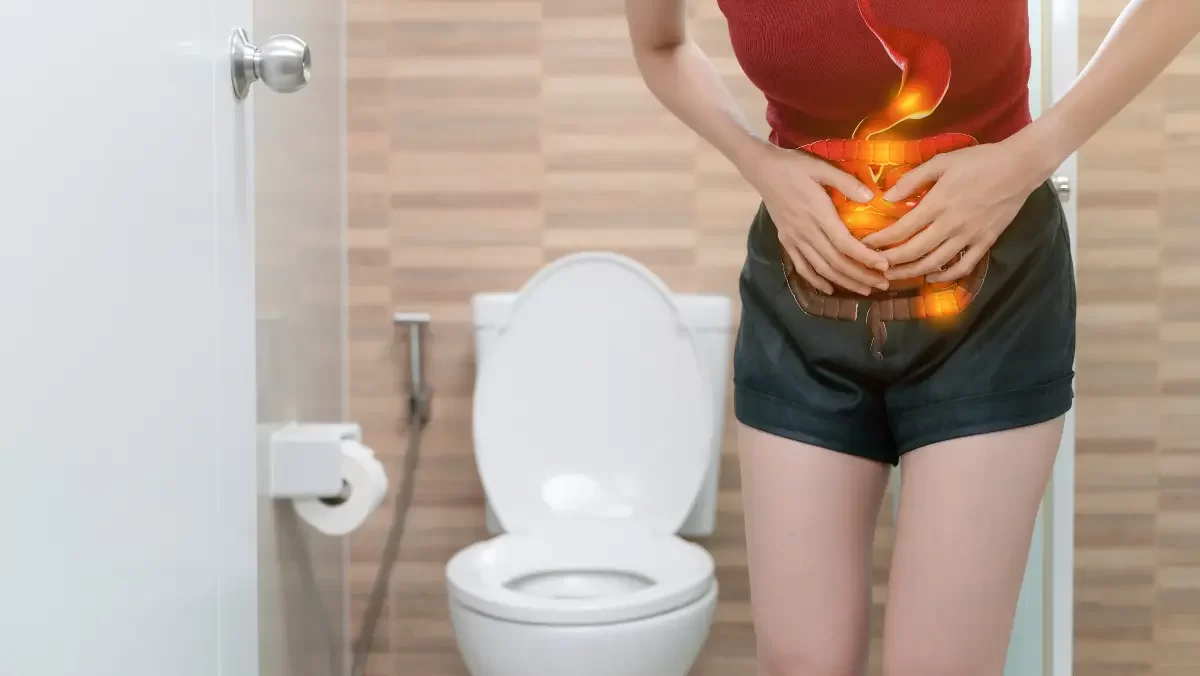Constipation and diarrhea are common bowel disturbances that can alternate or occur separately, often linked to diet, hydration, infections, medications, or gut disorders like IBS. Constipation means infrequent, hard stools and straining; diarrhea means loose, frequent stools and urgency. Both can sap energy, disturb sleep, and impair daily life if ignored. Early guidance and tailored constipation & diarrhea treatment in chennai help restore regularity, protect gut health, and prevent complications such as hemorrhoids, dehydration, and nutrient loss in children, adults, and seniors alike.
Symptoms
- Bowel pattern changes. Constipation shows fewer than three bowel movements weekly, hard pellets, or straining with a sense of incomplete emptying. Diarrhea brings three or more loose stools daily, urgency, or nighttime episodes disrupting rest and routine. This may signal the need for constipation & diarrhea treatment in chennai.
- Abdominal sensations. Cramping, bloating, or pressure can accompany either condition. Pain may ease after passing stool or gas, but persistent or escalating discomfort suggests underlying triggers requiring structured assessment and care.
- Stool characteristics. Mucus, unusually pale stools, or very dark stools may appear. Blood streaks, tarry stools, or persistent oiliness point to bleeding or malabsorption and warrant prompt evaluation to prevent deterioration.
- Systemic effects. Fatigue, lightheadedness, or headache can arise from dehydration or electrolyte shifts. Fever with diarrhea indicates possible infection; unintended weight loss implies malabsorption or chronic inflammation.
- Red flags in children and older adults. Irritability, refusal to eat, or sunken eyes in children suggest fluid loss. In older adults, confusion or weakness may reflect dehydration, needing swift correction and monitoring.
- Medication-links. New symptoms after starting iron, opioids, antacids, antibiotics, or metformin are common. Tracking onset relative to medicines helps target safer alternatives or dosage adjustments under clinical guidance.
Causes
- Dietary patterns. Low fiber, inadequate water, and irregular meals slow transit and harden stools. Conversely, excess caffeine, spicy foods, or artificial sweeteners can speed transit and trigger diarrhea in sensitive individuals.
- Infections. Viral gastroenteritis, bacterial foodborne illness, or parasites disturb the intestinal lining. Post-infectious IBS can follow, with alternating bowel habits that benefit from stepwise care and monitoring.
- Medications and supplements. Opioids, iron, calcium, and some antidepressants cause constipation; antibiotics or magnesium-containing antacids can cause diarrhea. Reviewing pill timing and dosing is essential before major changes.
- Functional gut disorders. IBS, pelvic floor dyssynergia, and slow-transit constipation alter motility and coordination. Stress and poor sleep can amplify nerve sensitivity, worsening cramps and urgency.
- Systemic and endocrine conditions. Diabetes, thyroid disorders, pregnancy, celiac disease, and inflammatory bowel disease can shift gut function. Identifying these drivers changes management from symptom-only relief to root-cause treatment.
- Lifestyle and microbiome. Sedentary routines reduce bowel stimulation, while disrupted microbiota from frequent antibiotics impairs stool form. Probiotic and dietary strategies can help alongside constipation & diarrhea treatment in chennai when chosen thoughtfully.
Complications
- Dehydration and electrolyte imbalance. Persistent diarrhea depletes fluids and salts, causing cramps, dizziness, or heart rhythm issues. Severe cases may need IV fluids to stabilize circulation and protect kidney function.
- Hemorrhoids and fissures. Straining with hard stools injures delicate tissue, leading to pain, swelling, or bleeding. Early softening strategies prevent cycles of fear, withholding, and worsening constipation.
- Malnutrition and weight changes. Chronic diarrhea reduces nutrient absorption, causing fatigue, hair thinning, or anemia. Children risk growth delays, while adults may develop vitamin deficiencies that compound weakness.
- Fecal impaction and overflow. Longstanding constipation can create a hard mass that blocks stool passage, paradoxically causing leakage. Targeted disimpaction and retraining are needed to reset bowel rhythms.
- Quality-of-life impacts. Fear of urgency or pain restricts travel, work, and social life. Anxiety and poor sleep are common, so plans should address routines, reassurance, and practical supports.
- Healthcare utilization. Recurrent flares increase tests and clinic time; clarifying drivers and expectations reduces cycles of urgent care. Structured constipation & diarrhea treatment in chennai limits relapses and improves long-term stability.
When to See a Provider
- Alarming features. Blood in stool, black tarry stools, fever, nighttime diarrhea, or unintentional weight loss require timely clinical evaluation. These signs may indicate infection, inflammation, or bleeding needing structured care.
- Persistent or recurrent symptoms. Constipation lasting over three weeks or diarrhea beyond two weeks merits assessment. Early constipation & diarrhea treatment in chennai prevents dehydration, impaction, and repeated sick days.
- Age and comorbidities. Very young children, pregnant individuals, and older adults with heart, kidney, or endocrine disease are vulnerable to rapid decline. Lower thresholds for assessment protect safety and function.
- Medication-related changes. New bowel issues after opioids, iron, or antibiotics need a review, dose adjustments, or safer alternatives. A constipation treatment doctor in chennai can tailor regimens and monitoring plans.
- Accessing expertise. Consider Diarrhea Treatment in Chennai when episodes are frequent, disruptive, or linked to travel or contaminated food. Inquire about constipation treatment cost in chennai to plan investigations and therapies without surprises.
- Local care options. Those near Arumbakkam can consider constipation treatment in Arumbakkam for convenient follow-up. At Prime Indian Hospital, Dr. R. Kannan provides evidence-based pathways that align diagnostics with lifestyle needs.
Treatment
- Hydration, fiber, and stool form targets. Gradual fiber increase, adequate fluids, and routine timings improve stool consistency. Soluble fiber helps both conditions; osmotic laxatives or bulking agents are added under supervision.
- Antidiarrheals and gut-calming strategies. Short courses of loperamide or racecadotril reduce frequency, while oral rehydration restores salts. Probiotics may shorten infectious diarrhea; persistent cases need directed testing and Diarrhea Treatment in Chennai.
- Medication review and adjustments. Tapering constipating drugs or switching antibiotics reduces triggers. A constipation treatment doctor in chennai can coordinate changes with your primary prescriptions and monitor response.
- Targeted therapies. Secretagogues, prokinetics, or pelvic floor biofeedback aid refractory constipation; bile acid binders or rifaximin help select diarrhea phenotypes. Personalized constipation & diarrhea treatment in chennai aligns tools to mechanisms.
- Integrated care setting. Structured pathways at centers offering constipation treatment in chennai streamline dietetics, physiotherapy, and counseling. Discuss constipation treatment cost in chennai upfront to map tests, medicines, and follow-ups.
- Convenience and locality. Options for constipation treatment in Arumbakkam support steady follow-through and fewer disruptions. Programs led by experts like Dr. R. Kannan at Prime Indian Hospital provide coordinated constipation & diarrhea treatment in chennai that balances efficacy and safety.
Prevention
- Balanced diet and steady hydration. Aim for 25–35 grams of fiber from vegetables, fruits, legumes, and whole grains, paired with regular fluid intake. Consistency keeps stool form predictable and reduces cramps or urgency.
- Rhythm and movement. A daily window for unhurried bowel time and routine physical activity enhance gut motility. Even brisk walking stimulates reflexes that help maintain regularity and confidence outside the home.
- Food hygiene and smart choices. Hand hygiene, safe water, and careful food handling reduce infectious diarrhea risk. Trial eliminations of triggers—excess caffeine, spicy foods, or sugar alcohols—can curb flares without overly restrictive diets.
- Sleep and stress care. Good sleep hygiene and stress management lower visceral sensitivity and motility swings. Brief breathing drills or mindfulness before meals can smooth gut responses.
- Medication awareness. If starting iron, opioids, or antibiotics, preemptive plans limit side effects. Discuss alternatives or supports rather than stopping essential therapy abruptly.
- Structured support. Ongoing constipation & diarrhea treatment in chennai includes coaching on routines, hydration, and travel kits. If relapses occur, coordinated reviews within constipation treatment in chennai services refine care and keep momentum without setbacks.
Conclusion
Constipation is a common issue that can impact a person’s health and well-being. By understanding its causes, symptoms, and treatment options, individuals can better manage the condition. Lifestyle changes, including a high-fiber diet, staying hydrated, and regular exercise, play a vital role in preventing and treating constipation. At Prime Indian Hospital, our team of professionals is dedicated to providing personalized care to address digestive issues and support patients in achieving optimal digestive health.














